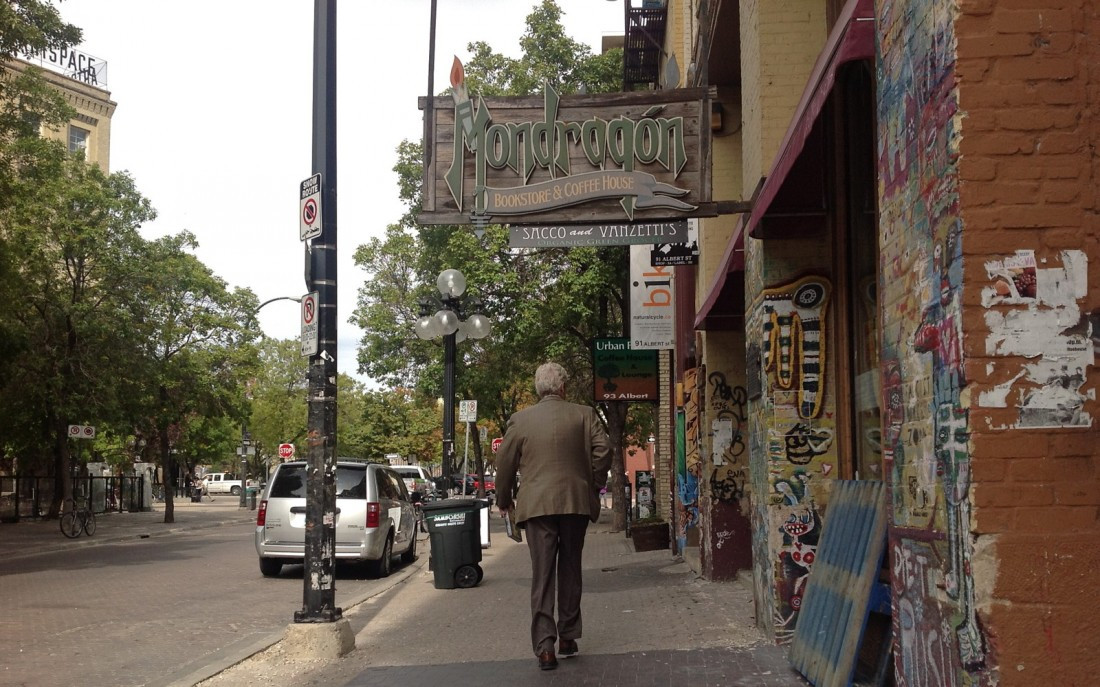Lessons of Mondragon
Why small business needs more than vocal support
It’s never delightful when a community enterprise is forced to close after 18 years in business. Nor is it pleasing to write an obituary for one of Winnipeg’s last strongholds of progressive thought and alternative dialogue for nearly two decades.
On January 26, Mondragon Bookstore and Coffeehouse shuttered its windows for good.
The Exchange District co-op was a longtime community junction, vegan restaurant and bookstore since an initial collective of ten members led by activists Paul Burrows and Sandra Drosdowech opened it in 1996. As a terminal of political organizing, speakers and great food, the business held a special place in the hearts of many. It was emblematic of the virtues of participatory economics within capitalist society: non-hierarchical, united and equitable. An anarchistic vision, if you will.
But after two years of low turnover and disappearing profits, a ghostly vacancy now sits inside the Old Market Autonomous Zone at 91 Albert Street.
Mondragon’s closure is a disheartening loss for Winnipeg during what has been a precarious era for small bookstores across the country. Declining print sales, down a total of 11% in 2013 according to BooknetCanada.ca, have forced even large retailers like Chapters to consolidate their branches and diversify product lines. Electronic books are now sold in bulk to customers via computerized algorithms of “popular purchases”, while sites like Amazon retain the exclusive luxury of heavily discounting new releases. Both trends have left little incentive to pay full price, or even visit a local shop in the first place.
The narrative seems all too familiar. Small businesses are continually celebrated by politicians as the backbone of our national economy yet are also the most frequent and immediate victims of market forces. When frugality and convenience are paramount, bookstores are no longer a protected industry. When a quick web search can produce a printable PDF version of an entire text, bookselling becomes hard-core retailing.
Calling Mondragon simply a bookstore, however, minimizes a more significant role. A small business though it was, the shop housed a locally revered vegan restaurant, sold groceries and fair trade coffee and provided valuable resources to those seeking an understanding of the world around them. For young students and workers especially, pinched by economic recession and underemployment, access to anarchist literature, Marxist political economy and radical thinkers introduced a universe of thought. Even the uninitiated, those without the privilege of post-secondary education, were welcome.
“ If, as the old adage goes, people value something, they have to support it.
It was a common space for an expanding community of grassroots activists searching for political consciousness in a changing world. Mondragon was their foundation: a place where ideas, books and activism intersected in a quasi-revolutionary form.
But like any business Mondragon was bound by the need for adaptation. After all, it was the sole cooperative enterprise in a neighborhood of competing restaurants and speciality shops, and hardly the lone vegan eatery in Winnipeg. Its survival could not always depend upon a niche clientele. On Mondragon’s final day in business, only four collective members remained, a new book order had not been placed in over a year and what stock did remain collected dust on the shelves. For the last week, a 66% sale on all items seemed the only way to clear inventory.
Indeed, complacency in the face of market forces was the greatest blow to Mondragon’s survival, though in some ways its very existence was taken for granted. If, as the old adage goes, people value something, they have to support it. People must use their local shops, purchase goods and services from them, if they want them to stay. Those who lamented publicly the closure of Mondragon, only to scoop up its remaining books at a discount, acted presumptively; they assume the survival of small businesses relies on nominal support alone. But monetary investment isn’t always an individualistic act. It supports ideas, fosters communities and ensures a collective future.
Mondragon’s 18 years in the A-Zone will be remembered fondly. It was an important cooperative unique to North America, and it impacted anyone who enjoyed a meal or shared conversation within its walls. Today it is a testament to the successes of participatory economics. Tomorrow it may serve as an even more important caveat: that in difficult times, ideas, beliefs and communities are never fulfilled on their own, they are earned together.
Harrison Samphir is the Uniter’s senior editor.







